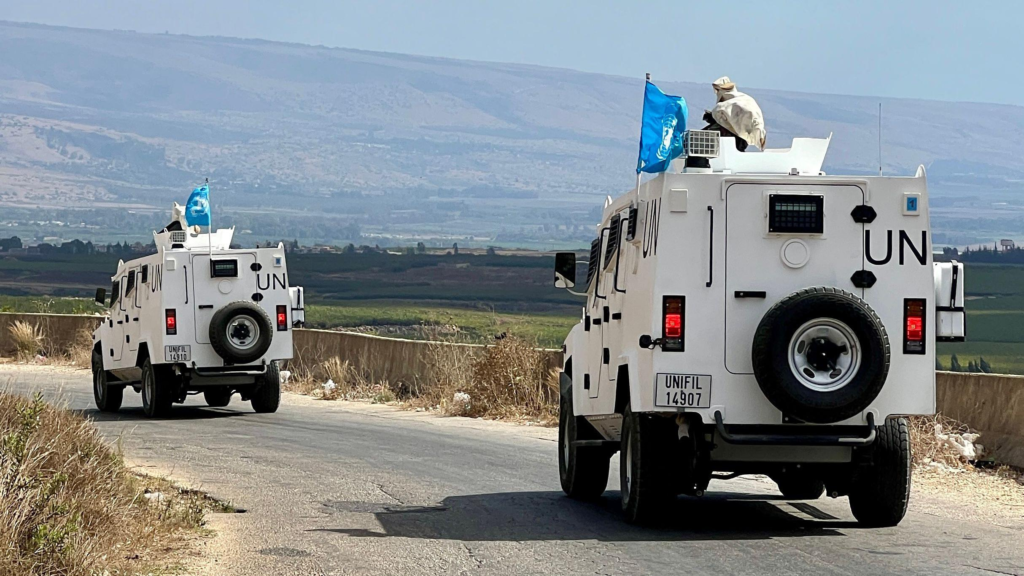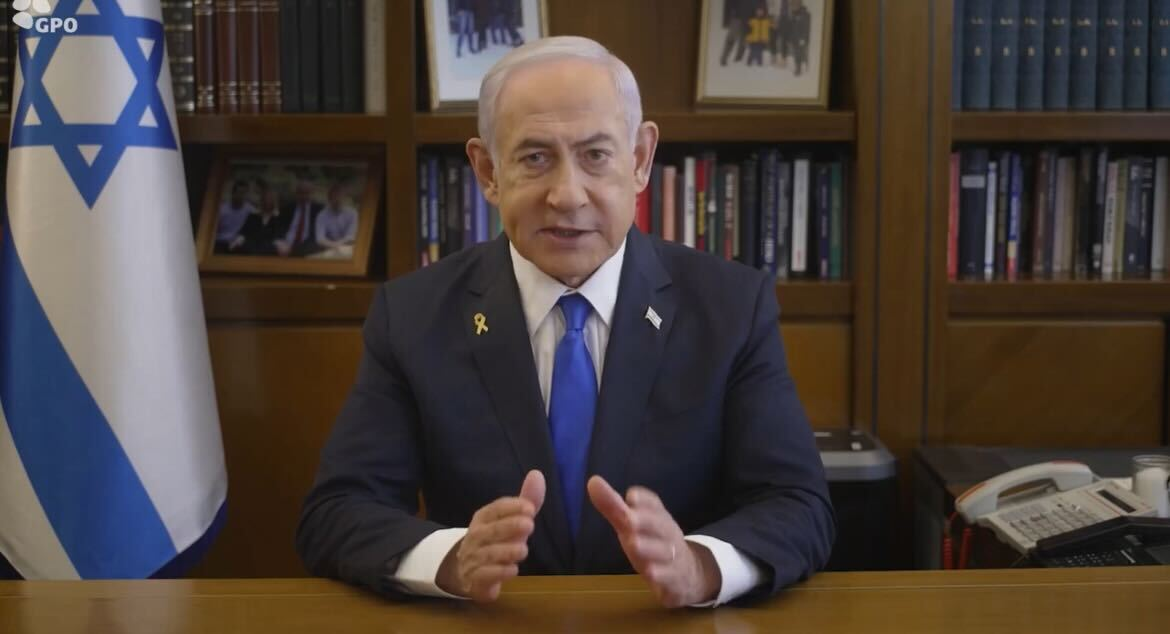In a heated escalation of the conflict between Israel and Hezbollah, Israeli Prime Minister Benjamin Netanyahu has publicly called for the immediate withdrawal of the United Nations Interim Force in Lebanon (UNIFIL) from southern Lebanon.
He addressed UN Secretary-General Antonio Guterres, urging the removal of peacekeepers to prevent them from becoming “hostages of Hezbollah.” Netanyahu’s plea reflects growing tensions in the region, as Israel intensifies its military campaign against Hezbollah, while the UN maintains a delicate mission aimed at maintaining peace.
The Call for Withdrawal: Netanyahu’s Warning to the UN
Prime Minister Netanyahu’s call for the withdrawal of UNIFIL comes amidst a series of violent confrontations between Israeli forces and Hezbollah militants near the Lebanon-Israel border.
In a public video statement, Netanyahu urged Guterres to take swift action, stating, “Secretary-General, get the UNIFIL forces out of harm’s way. It should be done right now, immediately.” This urgent appeal underscores Israel’s concerns over the safety of UN peacekeepers in a region rife with instability.
Read : Israeli Strike Silenced a Beating Heart of Lebanon as it Ruins Nabatiyeh Market
Netanyahu’s statement marks a significant shift in Israel’s approach to the role of international peacekeepers in Lebanon. He claimed that the presence of UNIFIL forces in southern Lebanon makes them vulnerable to Hezbollah, a group that Israel views as a significant threat.
Read : Israeli Foreign Minister Threatens Iran, Saying It ‘Deserves to Be Destroyed’
By describing UNIFIL personnel as potential “hostages of Hezbollah,” Netanyahu emphasized the risks posed to the peacekeepers in an increasingly dangerous combat zone.
Netanyahu also expressed his regret over a recent incident in which Israeli forces injured two UNIFIL soldiers during military operations in southern Lebanon. Although he stated that Israel was doing everything possible to avoid harm to UN personnel, the situation has highlighted the fragility of the peacekeeping mission in a volatile environment.
The Role of UNIFIL in Southern Lebanon
UNIFIL was established in 1978 by the United Nations Security Council to confirm the withdrawal of Israeli forces from Lebanon and restore peace in the area. Over the decades, the peacekeeping mission has played a crucial role in monitoring the cessation of hostilities between Israel and Lebanon, especially in the aftermath of the 2006 Israel-Hezbollah war.
Operating under the mandate of UN Security Council Resolution 1701, UNIFIL’s primary objectives include ensuring that the border area between Israel and Lebanon remains free of unauthorized military presence and helping the Lebanese government maintain security.
#Trending 🚨 #hot #UN ⚡️ #Israeli PM @netanyahu threaten UN post attacking #UNIFIL peacekeepers:
— Joseph Menslage (@KCMagazine) October 13, 2024
"Am addressing UN Secretary-General directly: your refusal to evacuate UNIFIL soldiers is turning them into #Hezbollah hostage
we asked countless times to evacuate,u kp refusing" pic.twitter.com/kdxweabaJf
With over 10,000 personnel from various countries, UNIFIL’s presence in southern Lebanon has been a key factor in preventing the escalation of conflict in the region. However, in recent years, Israel has expressed growing frustration with UNIFIL’s effectiveness, accusing the mission of failing to stop Hezbollah from increasing its military presence near the border.
Tensions between Israel and Hezbollah have flared since October when Israel launched ground operations and airstrikes targeting Hezbollah positions near the border. As the conflict has intensified, the danger to peacekeepers has grown, with both sides blaming each other for escalating the violence.
On Friday, UNIFIL condemned an attack on its peacekeepers, calling it a “grave violation of international humanitarian law and Security Council Resolution 1701.” The UN body reiterated that attacks on peacekeepers put them in “extremely grave danger,” and any deliberate targeting of UN forces is considered a serious breach of international law.
Israel’s Growing Campaign Against Hezbollah
The conflict between Israel and Hezbollah is rooted in decades of animosity, with each side accusing the other of provocations and violations of peace agreements.
Hezbollah, a powerful Lebanese political party and militia group backed by Iran, has long been a thorn in Israel’s side, particularly due to its strong military presence near the Lebanese border. Israel views Hezbollah as a proxy for Iran’s influence in the region, while Hezbollah claims to defend Lebanon from Israeli aggression.
In recent months, the conflict between the two has escalated significantly. Israel has stepped up its military campaign against Hezbollah, carrying out targeted airstrikes, artillery bombardments, and ground operations aimed at crippling the group’s military infrastructure.
The southern suburbs of Beirut, a known Hezbollah stronghold, have borne the brunt of these attacks. Meanwhile, Hezbollah has retaliated with rocket fire and cross-border attacks, further fueling the conflict.
Since October, Israeli forces have been actively engaging Hezbollah militants along the Lebanese border, with the situation escalating into a full-scale military confrontation.

The Israeli military has launched a series of ground operations to neutralize Hezbollah’s presence, with airstrikes targeting key positions and strongholds. In southern Lebanon, particularly in the areas surrounding the Lebanese border, Israeli artillery bombardments have intensified, causing widespread destruction.
Netanyahu’s government has argued that UNIFIL has failed in its mission to curb Hezbollah’s growing influence and that the peacekeepers’ presence has been ineffective in preventing the militant group from fortifying its positions.
Israeli officials have repeatedly stated that UNIFIL is unable to enforce the provisions of Resolution 1701, which calls for the area to be free of weapons and forces other than those of the Lebanese state.
In his conversation with Guterres, Netanyahu highlighted the danger that Hezbollah poses not only to Israel but also to UN peacekeepers. He stressed that Israel’s military operations are aimed at eliminating Hezbollah’s influence and that any harm to UN personnel was unintended collateral damage. Netanyahu’s message is clear: as long as Hezbollah remains in southern Lebanon, UNIFIL peacekeepers will continue to be at risk.
The Future of UNIFIL in Southern Lebanon
Netanyahu’s call for the withdrawal of UNIFIL raises serious questions about the future of the peacekeeping mission in southern Lebanon. If the UN were to heed Israel’s demands and withdraw its forces, it would mark a significant shift in the balance of power in the region.
UNIFIL has been a stabilizing presence in southern Lebanon for decades, and its removal could pave the way for even greater conflict between Israel and Hezbollah.
On the other hand, if the UN refuses to withdraw its forces, as it has done in the past, it risks placing peacekeepers in the crossfire of an escalating war. The safety of UNIFIL personnel has been a major concern for the international community, with several contributing countries expressing alarm over the growing number of attacks on peacekeepers.
The situation is further complicated by the broader geopolitical context of the Israel-Hezbollah conflict. Iran, Hezbollah’s main backer, has been deeply involved in the conflict, providing financial and military support to the Lebanese group.
Israel’s campaign against Hezbollah is not only a local conflict but also part of a larger struggle between Israel and Iran for dominance in the region.

The involvement of Iran has raised fears that the conflict could spiral into a wider regional war, drawing in other countries and destabilizing the Middle East. As such, the presence of UNIFIL, despite its limitations, has been seen as a necessary buffer to prevent the situation from deteriorating further.
In the meantime, the UN has reiterated its commitment to maintaining peace and stability in southern Lebanon, emphasizing that any attacks on peacekeepers will not be tolerated.
The international community, including key players such as the United States and European countries, has also expressed concern over the escalating violence and urged both Israel and Hezbollah to exercise restraint.
While Netanyahu’s call for the withdrawal of UNIFIL reflects Israel’s frustrations with the peacekeeping mission, it remains to be seen whether the UN will take any action.
The decision to withdraw peacekeepers would have far-reaching consequences for the region and could open the door to even more intense fighting between Israel and Hezbollah.

